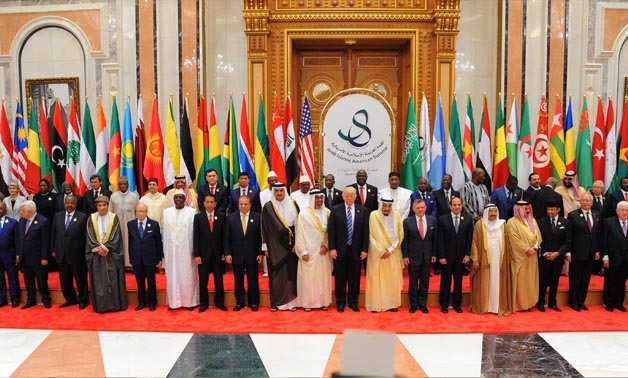
Arab leaders and U.S. President Trump pose for a picture at the Arab-Islamic-American summit in Riyadh- press photo
CAIRO – 21 May 2017: The Iranian issue overshadowed the Arab-Islamic-American Summit’s discussions held Sunday in Riyadh in the presence of about 55 Arab and Islamic countries.
The speeches of the Saudi and American leaders showed a clear consensus in their visions. Both Saudi King Salman bin Abdulaziz and U.S. President Donald Trump agreed on confronting the growing Iranian threat in the Middle East.
“We cannot blame the Iranian people for their government’s crimes… The Iranian regime has been the spearhead of terrorism since the Khomeini revolution,” said King Salman, France24 reported.
He also stressed his rejection and condemnation of discrimination between people on the basis of religion or sect, adding that his country has not experienced “any terrorism or extremism for 300 years until the Khomeini revolution took place in 1979."
In the same context, Trump said, “Iran has a great history but its people suffer from a reckless regime,” the Kuwaiti news agency reported.
The American president accused Iran of financing, arming, training terrorists and igniting sectarian conflicts in Lebanon, Iraq and Yemen, acts which are destabilizing the whole region.
He also pointed out that Iran's interference operations are very clear in Syria, saying that Syrian President Bashar al-Assad continues to commit crimes against his people thanks to Iranian support.
"Iran has committed crimes against its people and we must work together to isolate Iran and prevent it from financing terrorist organizations," Trump said, stressing that the regime's most prominent victim in Tehran Is the Iranian people.
For his part, King Salman said that Iran had rejected all Saudi initiatives for reconciliation and continued to interfere in other countries’ affairs, violating international law.
Saudi Arabia decided in January 2016, to sever diplomatic relations with Iran for the second time following a violent attack on its embassy in Tehran during protests against executions in the Kingdom.
During Trump's election campaign he vowed to cancel the nuclear agreement with Tehran if elected, calling it "the worst deal ever".
Along with the P5+1 (five permanent UN Security Council members plus Germany), the United States under the Obama administration touted the nuclear deal as a crucial move towards detente with Iran and regional peace.

Comments
Leave a Comment